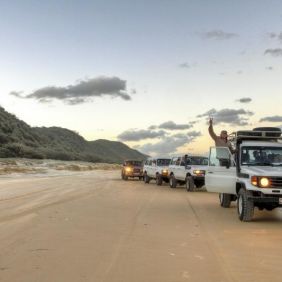Because money and stuff is good right? Yes, working kinda sucks but the money is definitely a good thing.
#10: You totally get 9.5% superannuation
If you earn more than $450 per month (and hopefully you are, because how else are you paying for those sweet, sweet, overpriced Aussie beers), your employer must contribute 9.5% of your gross wage to a superannuation fund on your behalf.
Super is a retirement fund, but you can claim it back when you finish working and leave Australia. Some jerky employers may tell you they don’t have to pay your super if you’re on a visa but this is bullshit.
You are entitled to this extra money and it is your right to receive it, so go get that hard earned cash.

Via: Giphy
#9: Don’t be basic, make sure you’re getting paid the minimum wage
From July 1 2016, the minimum wage in Australia is $17.70 per hour.
As a backpacker, you’re probably going to get offers to work for less. Look we get that when you’re down to your last pack of two minute noodles it’s tempting to take these offers, and you totally can, but know that legally you don’t have to.
You are entitled to the same working rights as Australian citizens and $17.70 minimum per hour is your right. Even though you’re not from here, we’ll take care of you.

Via: Giphy
#7: Be careful paying up-front for accommodation or transport to a job
There have been reports of scammers posing as real companies seeking backpackers for work. They are requesting that potential employees pay transport and / or accommodation fees up-front.
So you don’t lose your valuable travel dollars, do not make any payments without full verification from the company’s booking department (if a working hostel) and payment should only be made through a trusted and reliable traceable source. A receipt should always be obtained for any working accommodation bookings and if transport to a job is privately ran, do not pay up-front, pay only on arrival once you’ve been on the transport and know it’s legit.

Via: Giphy
#6: WWOOFing no longer counts towards your 2nd Working Holiday Visa
“WWOOF” stands for: “World Wide Opportunities on Organic Farms “ and is sometimes also referred to as: “Willing Workers on Organic Farms.” The deal is simple, you work on an Australian organic farm, but instead of receiving a wage, you get your meals and accommodation provided instead.
Unfortunately from December 1 2015, WWOOFing no longer counts towards the 2nd WHV and only paid work with payslips can be provided for the visa application.
So make sure you look something like this when you enter your visa interview:

Via: Giphy
#5: Do a work course to help you find casual employment
Hospitality and labouring are two great industries for backpackers to work in. Work is available Australia-wide and jobs are usually short-term to suit your travel plans. But in order to work in these industries, you might need to pay for a work course.
If you want to work in hospitality, you should do a Responsible Service of Alcohol (RSA) course so you know how to deal with that guy at the bar who’s had a few too many (a high five isn’t appropriate).
The course goes for 1 day and is a legal requirement if your job involves serving alcohol. If you’re looking to work from city to city, you’ll need a different certification per state so keep this in mind if you want to spend summer in Byron and jump up to Cairns for winter.
Similarly, if you want to work in construction, you’ll need a white card. This is a mandatory course for all workers carrying out construction work, including: Self-employed persons, labourers, apprentices and trades-persons. It’s a 1-day course that will enable you to work in the construction / labourer industry upon completion. The national white card is recognised in all states and territories of Australia and once you have a current white card you are able to work everywhere in the country. Average costs are between $59-$100.

Via: Giphy
#4: Keep your receipts closer than your passport
Keep your receipts for anything you purchase for work: This is a ‘work related expense’ and you can actually claim back a portion of the money you spent on the course when you apply for your tax return with Taxbacker / Aussie Tax Returns. This will help you get more tax back. Receipts for work courses, uniforms, tools all count. Yiew, free money!

Via: Giphy
#3: Drop your dollars right before you leave and get 10% back
Goods and Services Tax (GST) is a 10% tax built-in tax to most stuff you splurge on. It can be claimed back at the airport if you buy up big within 60 days of leaving Australia. So if you're planning on buying something big (like a new iphone after you undoubtedly broke yours on your travels), it's best to do it within 2 months of leaving, so you can get 10% back. Unfortunately, this doesn’t include food so that $300 you spent on your Maccas hangover cure for the whole hostel doesn’t count.
To claim the 10% GST refund you have to spend a minimum of $300 or more on each receipt. You also need to take the goods in your hand luggage, as officials will ask to see items you are claiming for. Depending on what airport your departing from, the desk where you claim is past customs and usually near the duty free area.

Via: Giphy
#2: Be loyal to one super fund
We get it, it’s hard to be loyal to anything when you travel, but you really should be to your super fund.
Using a different superannuation fund for every job you work at will put a serious dent in your super savings. Super funds aren’t free, they cost money to keep open so if you have five different funds, you’ll pay five different fees. When you leave Australia and claim your super back, every super fund will charge a withdrawal fee so avoid paying multiple fees by having just one fund. Give your super fund name and membership number to every employer every time you get a new job.

Via: Giphy
#1: Control those #wanderlust urges and chill in Australia for 6 months to get your tax back
In order to get your tax back, you must be considered a “resident for tax purposes”. The way to get residency for tax purposes is to stay in Australia for a minimum period of 6 months continuously without any overseas travel, and to stay in one area / location for a minimum of 4 months.

Via: Giphy
We know it’s hard to stay still, but just think about that tax return cash. Remember, with Taxbacker / Aussie Tax Returns’ average refunds being $2,800, your tax back could pay for an entire trip to Bali.
Head to your nearest Peterpans store when you’re ready to apply for your tax with Taxbacker.



